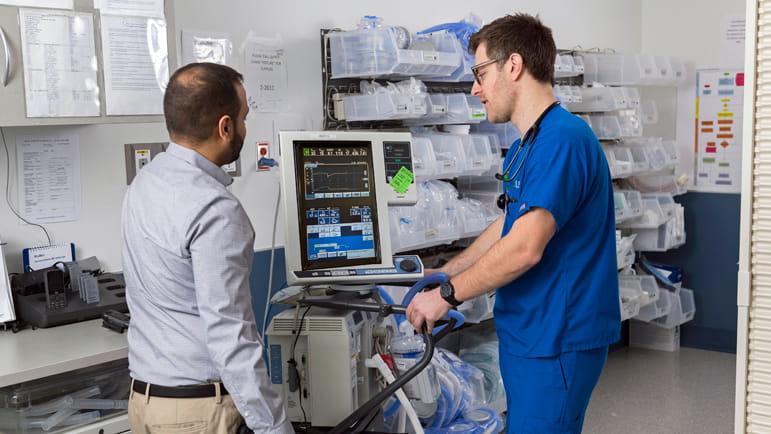RUSH University Medical Center and RUSH University have again been recognized for their high-quality patient care and education in respiratory therapy. The medical center’s respiratory care team and the College of Health Science’s respiratory care program recently were honored with APEX Recognition Awards in the acute care hospital and educational program categories, respectively.
The APEX Recognition Award is given to a select number of hospital systems and universities by the American Association for Respiratory Care. These awardees are chosen in recognition of significant contributions by their respiratory therapists and for demonstrating best practices in respiratory care. RUSH received the medical center’s fourth APEX award and the university’s third.
"The Apex Award is awarded to organizations that promote the highest-quality, evidence-based practices possible to improve patient outcomes,” said J. Brady Scott, PhD, RRT, RRT-ACCS, AE-C, FAARC, FCCP, associate professor, program director, College of Health Sciences, Department of Cardiopulmonary Sciences - Division of Respiratory Care. “The awards validate our team's commitment to excellent respiratory care and the patients and students we serve.”
“On a personal level, I am proud to be part of a team dedicated to excellence from the classroom to the bedside.”
RUSH is a leader in the respiratory care field, and its goal is to provide the best care and strive for the best patient outcomes. It has achieved these aims by developing protocols that provide autonomy for its staff while creating roles for them to influence outcomes and best practices throughout RUSH.
The team’s collaboration with the university’s respiratory care program has also played a part in its success. RUSH University is the only institution in Illinois to offer a master’s degree in respiratory care. This program offers current respiratory therapists at the medical center a pathway to continuing their education and students new to RUSH a glimpse into a possible future career at the medical center.
“The respiratory care program and clinical services epitomize the practitioner-teacher model,” said David Vines, PhD, RRT, FAARC, FCCP, chairperson and professor, Department of Cardiopulmonary Sciences and associate dean of Clinical Integration and Interdisciplinary Initiatives.
“We work together to advance the practice of respiratory care through innovation and research to improve patient outcomes here at the Medical Center.”
Most notably, both respiratory care students and respiratory therapists have played an integral role during the COVID-19 pandemic. The respiratory care team, with help from volunteering students, provided urgently needed care on the front lines while researching the best treatment options for patients with severe COVID-19 symptoms.
It changed the landscape for COVID-19 treatments with its research and implementation of proning, a treatment where patients lie face down on their beds for 16 hours at a time, with heated, humidified oxygen flowing through tubes in their noses. This treatment has seen success in improving breathing problems in patients with COVID-19.
Throughout the years, RUSH has built a respiratory care team and educational program that is unique, collaborative and ever-evolving. RUSH is highly involved with multiple leaders in professional respiratory organizations and has staff that are nationally recognized preceptors, educators, researchers and published authors.
Its integration of service and education has allowed RUSH to find innovative solutions for problems in the field and charge to the forefront as a leader in respiratory care.
About the Apex Award
APEX awards recognize respiratory care departments that exhibit high-quality patient care in the United States. The award also requires a minimum of 50% of the staff hold a bachelor’s degree or higher and be active in the American Association for Respiratory Care. The staff must all be licensed, with 80% or more holding the advanced registered respiratory therapist credential.

